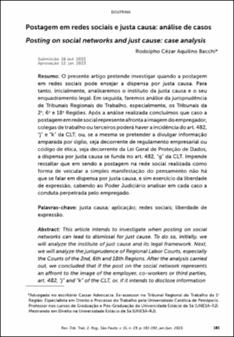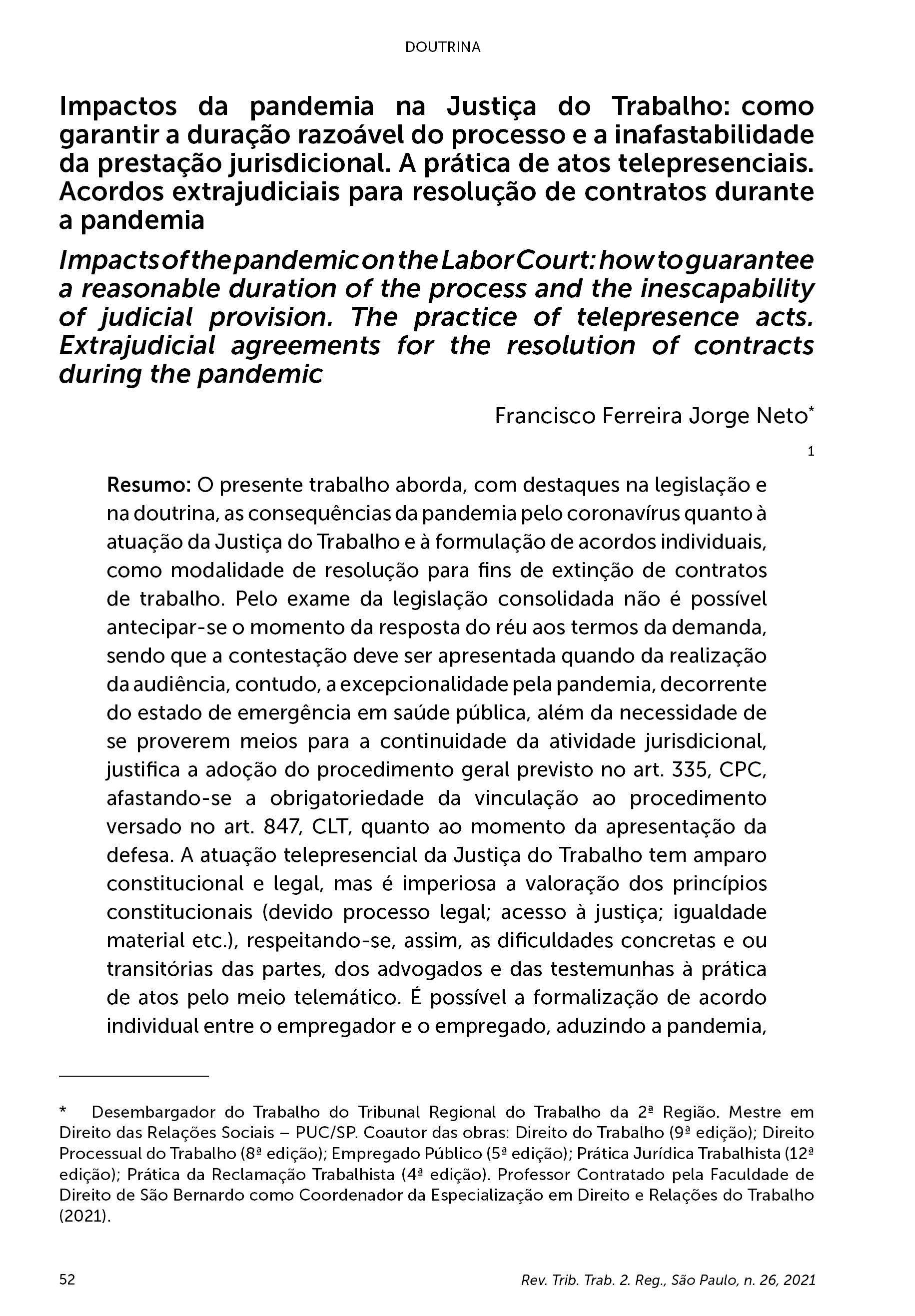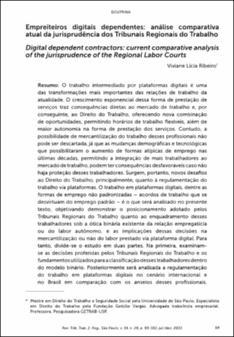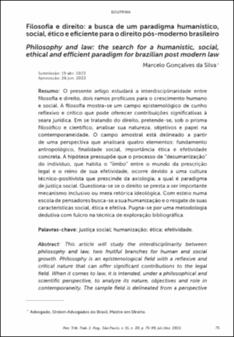Artigo de periódico
Postagem em redes sociais e justa causa: análise de casos
| dc.contributor | Bacchi, Rodolpho Cézar Aquilino | |
| dc.date.accessioned | 2023-05-18T15:27:53Z | |
| dc.date.available | 2023-05-18T15:27:53Z | |
| dc.date.issued | 2023-05-29 | |
| dc.identifier.citation | BACCHI, Rodolpho Cézar Aquilino. Postagem em redes sociais e justa causa: análise de casos = Posting on social networks and just cause: case analysis. Revista do Tribunal do Trabalho da 2ª Região, São Paulo, v. 15, n. 29, p. 181-192, jan./jun. 2023 | pt_BR |
| dc.identifier.uri | https://basis.trt2.jus.br/handle/123456789/15530 | |
| dc.description.abstract | [por] O presente artigo pretende investigar quando a postagem em redes sociais pode ensejar a dispensa por justa causa. Para tanto, inicialmente, analisaremos o instituto da justa causa e o seu enquadramento legal. Em seguida, faremos análise da jurisprudência de Tribunais Regionais do Trabalho, especialmente, os Tribunais da 2a, 6a e 18a Regiões. Após a análise realizada concluímos que caso a postagem em rede social represente afronta a imagem do empregador, colegas de trabalho ou terceiros poderá haver a incidência do art. 482, “j” e “k” da CLT, ou, se a mesma se pretender a divulgar informação amparada por sigilo, seja decorrente de regulamento empresarial ou código de ética, seja decorrente da Lei Geral de Proteção de Dados, a dispensa por justa causa se funda no art. 482, “g” da CLT. Impende ressaltar que em sendo a postagem na rede social realizada como forma de veicular a simples manifestação do pensamento não há que se falar em dispensa por justa causa, e sim exercício da liberdade de expressão, cabendo ao Poder Judiciário analisar em cada caso a conduta perpetrada pelo empregado. | pt_BR |
| dc.description.abstract | [eng] This article intends to investigate when posting on social networks can lead to dismissal for just cause. To do so, initially, we will analyze the institute of just cause and its legal framework. Next, we will analyze the jurisprudence of Regional Labor Courts, especially the Courts of the 2nd, 6th and 18th Regions. After the analysis carried out, we concluded that if the post on the social network represents an affront to the image of the employer, co-workers or third parties, art. 482, “j” and “k” of the CLT, or, if it intends to disclose information supported by secrecy, whether arising from business regulations or code of ethics, or arising from the General Data Protection Law, the waiver for fair cause is based on art. 482, “g” of the CLT. It is important to emphasize that, since the posting on the social network was carried out as a way of conveying the simple expression of thought, there is no need to talk about dismissal for just cause, but the exercise of freedom of expression, and it is up to the Judiciary to analyze the conduct in each case perpetrated by the employee. | pt_BR |
| dc.description.tableofcontents | Introdução -- Justa causa e postagens em redes sociais -- Análise Jurisprudencial -- Recurso Ordinário n. 5078.36.2010.5.06.0000 -- Recurso Ordinário n. 1000740-52.2021.5.02.0315 -- Recurso Ordinário n. 0011164-66.2021.5.18.0141 -- Conclusão | |
| dc.language.iso | pt_BR | pt_BR |
| dc.relation.ispartof | Revista do Tribunal do Trabalho da 2ª Região: v. 15, n. 29 (jan./jun. 2023) | |
| dc.subject | Despedida por justa causa | pt_BR |
| dc.subject | Jurisprudência trabalhista | pt_BR |
| dc.subject | Liberdade de expressão | pt_BR |
| dc.subject | Rede social | pt_BR |
| dc.subject | Regulamento | pt_BR |
| dc.title | Postagem em redes sociais e justa causa: análise de casos | pt_BR |
| dc.title.alternative | Posting on social networks and just cause: case analysis | pt_BR |
| dc.type.genre | Artigo de periódico | pt_BR |
| dc.type.material | Documento textual | pt_BR |
| dc.relation.ispartoflink | https://basis.trt2.jus.br/handle/123456789/15507 | |
| dc.publisher.place | São Paulo | pt_BR |
Coleção
-
Artigos de Periódicos132
Artigos de Periódicos








